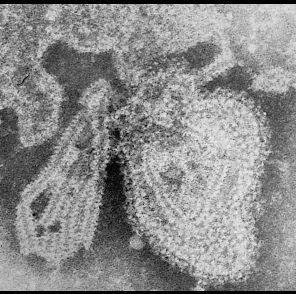Mumps virus
|
Mumps Microchapters |
|
Diagnosis |
|---|
|
Treatment |
|
Case Studies |
|
Mumps virus On the Web |
|
American Roentgen Ray Society Images of Mumps virus |
| style="background:#Template:Taxobox colour;"|Template:Taxobox name | ||||||||
|---|---|---|---|---|---|---|---|---|
 TEM micrograph of the mumps virus.
| ||||||||
| style="background:#Template:Taxobox colour;" | Virus classification | ||||||||
| ||||||||
| Type species | ||||||||
| Mumps virus |
Editor-In-Chief: C. Michael Gibson, M.S., M.D. [1]; Associate Editor(s)-In-Chief: Lakshmi Gopalakrishnan, M.B.B.S. [2]; Nate Michalak, B.A.
Overview
Mumps virus (MuV) is an enveloped, non-segmented, negative-sense RNA virus that causes mumps. MuV belongs to the genus Rubulavirus and family Paramyxovirus. Humans are the only natural host of MuV. MuV is transmitted through respiratory droplets (saliva or mucus), direct contact, or contact with surfaces carrying MuV. MuV is able to bind to host epithelial cells via haemagglutinin-neuraminidase (HN) and fusion (F) glycoproteins. Small hydrophobic (SH) protein is presumed to block TNFα-mediated apoptosis. Non-structural proteins NS1 and NS2 (V proteins) inhibit IFN production and signaling.
Organism
- Mumps virus (MuV) is an enveloped, non-segmented, negative-sense RNA virus that causes mumps.[1]
- MuV belongs to the genus Rubulavirus and family Paramyxovirus.
Morphology
- The spherical virion is approximately 200nm is diameter and its genome consists of a single RNA strand of 15,384 nucleotides.[2]
- The RNA is encapsidated by nucleoprotein (N protein) forming the ribonucleoprotein (RNP) complex.
Replication Cycle
- MuV binds to host cell sialic acid via haemagglutinin-neuraminidase (HN) and fusion (F) glycoproteins and cause virus-to-cell membrane fusion.
- Replication and transcription is mediated by an RNA polymerase complex composed of large (L) and phospho- (P) proteins.
- Budding is initiated after HN and F glycoproteins are transported through the endoplasmic reticulum and Golgi body to the cell surface.
- Matrix (M) protein localizes the RNP to the area of the host cell expressing HN and F.
Human Pathogen
- Humans are the only natural host of MuV.
- MuV is transmitted through respiratory droplets (saliva or mucus), direct contact, or contact with surfaces carrying MuV.
- MuV is able to evade an immune response to infection with the following virulence factors:
- Small hydrophobic (SH) protein is presumed to block TNFα-mediated apoptosis.[3]
- Non-structural proteins NS1 and NS2 (V proteins) inhibit IFN production and signaling.[4]
Related Chapters
References
- ↑ Rubin S, Eckhaus M, Rennick LJ, Bamford CG, Duprex WP (2015). "Molecular biology, pathogenesis and pathology of mumps virus". J Pathol. 235 (2): 242–52. doi:10.1002/path.4445. PMC 4268314. PMID 25229387.
- ↑ Hviid A, Rubin S, Mühlemann K (March 2008). "Mumps". The Lancet. 371 (9616): 932–44. doi:10.1016/S0140-6736(08)60419-5. PMID 18342688.
- ↑ He B, Lin GY, Durbin JE, Durbin RK, Lamb RA (2001). "The SH integral membrane protein of the paramyxovirus simian virus 5 is required to block apoptosis in MDBK cells". J Virol. 75 (9): 4068–79. doi:10.1128/JVI.75.9.4068-4079.2001. PMC 114152. PMID 11287556.
- ↑ Andrejeva J, Childs KS, Young DF, Carlos TS, Stock N, Goodbourn S; et al. (2004). "The V proteins of paramyxoviruses bind the IFN-inducible RNA helicase, mda-5, and inhibit its activation of the IFN-beta promoter". Proc Natl Acad Sci U S A. 101 (49): 17264–9. doi:10.1073/pnas.0407639101. PMC 535396. PMID 15563593.